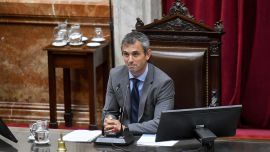Argentine banks took a beating last year, and the nation’s biggest lender says the industry is at risk of a repeat performance.
While bad loans and government regulations were the main culprits in 2020, rising inflation will be added to the list this year, according to Fabián Kon, chief executive officer of Banco Galicia, Argentina’s biggest bank by market capitalisation.
“If inflation is high, there is a risk that bank results will fall to very low or negative levels in real terms,” Kon said in an interview from his home in Buenos Aires.
Expectations are for exactly that: Argentina’s inflation rate was 36 percent in 2020, and Galicia predicts it will intensify to around 40 percent this year. That will compound problems for an economy that’s been devastated by a recession now in its third year, rising bad debt and shrinking demand for new loans. At the same time, extensive banking regulations have cut into profit margins.
Banco Galicia’s loan portfolio is concentrated in the consumer sector, with an emphasis on credit cards and personal loans. Kon’s challenge will be to sustain profitability even as government regulations undermine those businesses.
The central bank requires banks to pay minimum interest rates of 37 percent on retail deposits, while allowing them to charge just 24 percent on loans to small and midsize companies. Inflation, currency controls and restrictions on dividend distributions add to the headache for bank executives such as Kon.
Private banks on average posted a return on assets of 2.2 percent in November, the lowest level in eight months and one of the two worst months in the past 10 years, according to the latest report from the Central Bank. Return on equity dropped to 14.6 percent, the lowest since 2007.
Kon, who joined the bank 20 years ago and has been general manager since 2016, said his strategy is threefold: boost the number of clients by five percent in 2021, deepen its relationships with customers and aggressively expand digitisation.
The 62-year-old CEO said he’s also open to acquiring smaller banks in the local market, where results have also taken a beating.
“Galicia today has historically high capitalisation levels, and it’s going to be a player in the opportunities that arise in that consolidating market,” he said.
Kon declined to name possible targets, but said the country’s fintech landscape has become crowded. Digital firms with fewer than two million users will struggle to be profitable, according to Kon.
Grupo Financiero Galicia, the bank’s parent company, is the most liquid stock in Argentina, and is typically a top beneficiary of inflows when investor optimism improves. Shares of the company tumbled 46 percent in 2020, while competitors Banco Macro SA and Banco BBVA Argentina SA fell 57 percent and 42 percent, respectively.
Argentine markets were hit hard by the nation’s US$65-billion debt restructuring in September, Kon said.
Galicia expects its non-performing loan ratio, which was 2.5 percent in the third quarter of last year, to fall in 2021 as the pandemic subsides. Loan growth will be “much higher” than in 2020, when peso-denominated loans increased 50 percent in the third quarter from a year earlier.
Kon said the Central Bank should remove measures that allow individuals to postpone payments on their loans, which make it hard for banks to assess whether the loans will be paid or not; discourage the use of the cash economy, which is often associated with tax evasion; and allow banks to compete on loan interest rates. Current Central Bank regulations mean banks must charge very similar rates.
A key driver for Argentine assets this year – including shares of Galicia – will be the government’s talks to delay US$44 billion in payments to the International Monetary Fund. Kon said he expects the negotiations will be slow, and that the IMF will call for limits on government spending and for changes to capital controls that have been put in place.
The controls are a “transitory solution” that should be ended as the country fixes its macro imbalances, he said. Since September 2019, the country has increasingly limited access to hard currency, leading to the growth of parallel black-market rates.
“We don’t expect the conditions will be there to unify the exchange rates in 2021,” Kon said. “This may be possible in 2022, after a reduction in the fiscal deficit and a period in which the Central Bank accumulates reserves.”
by Ignacio Olivera Doll & Scott Squires, Bloomberg






















Comments